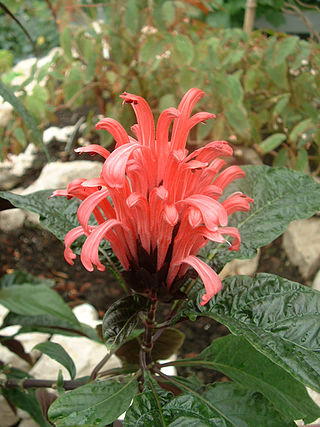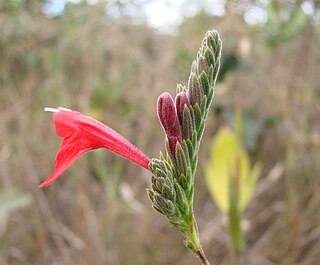
Justicia is a genus of flowering plants in the family Acanthaceae. It is the largest genus within the family, with over 900 accepted species. They are native to tropical to warm temperate regions of the Americas, India, and Africa. The genus serves as host to many butterfly species, such as Anartia fatima. Common names include water-willow and shrimp plant, the latter from the inflorescences, which resemble a shrimp in some species. The generic name honours Scottish horticulturist James Justice (1698–1763). They are closely related to Pachystachys.

The Cerrado is a vast ecoregion of tropical savanna in eastern Brazil, being present in the states of Goiás, Mato Grosso do Sul, Mato Grosso, Tocantins, Maranhão, Piauí, Bahia, Minas Gerais, São Paulo, Paraná and the Federal District. The core areas of the Cerrado biome are the Brazilian highlands – the Planalto. The main habitat types of the Cerrado consist of forest savanna, wooded savanna, park savanna and gramineous-woody savanna. The Cerrado also includes savanna wetlands and gallery forests.
Justicia chrysotrichoma is a species of flowering plant in the family Acanthaceae. It is native to the Cerrado ecoregion of central Brazil.
Tyloglossa genistiformis is a species of flowering plant native to southeastern Brazil, where it grows in the Cerrado ecoregion.

Justicia lanstyakii is a plant native to the Cerrado vegetation of Brazil, first described by Carlos Toledo Rizzini in 1946.
Justicia nodicaulis is a plant native to Bolivia and west-central and southeastern Brazil, where it grows in the Cerrado ecoregion.
Justicia pycnophylla is a species of flowering plant native to the Cerrado ecoregion of west-central Brazil.
Justicia riparia is a species of flowering plant. It is endemic to southeastern Brazil, where it is native to the Cerrado vegetation.
Justicia sarothroides is a species of flowering plant native to the Cerrado ecoregion of west-central Brazil.
Justicia serrana is a plant native to the Cerrado vegetation of Brazil.
Justicia warmingii is a species of flowering plant in the family Acanthaceae. It is native to Bolivia, southeastern and west-central Brazil, Paraguay, northwestern Argentina, and Peru. In Brazil it grows in the Cerrado ecoregion.
Justicia triloba is a species of flowering plant in the family Acanthaceae. It a shrub native to the Caatinga vegetation and Cerrado vegetation of Brazil, ranging from Tocantins to Piauí and Minas Gerais states.
Ruellia densa is a species of flowering plant in the family Acanthaceae. It is a native to the Cerrado region of central Brazil.
Justicia oncodes is a species of flowering plant endemic to central and eastern Brazil, where it is native to the Cerrado ecoregion.
Justicia tocantina is a species of perennial flowering plant native to Bolivia, west-central and southeastern Brazil, and Paraguay, including the Cerrado ecoregion of Brazil. This plant is cited in Flora Brasiliensis by Carl Friedrich Philipp von Martius.
Ruellia menthoides is a species of flowering plant native to northern, eastern, and central Brazil, Bolivia, Peru, and Venezuela. In Brazil it grows in the Cerrado ecoregion. This plant is cited in Flora Brasiliensis by Carl Friedrich Philipp von Martius.
Ruellia dissitifolia is a species of flowering plant in the family Acanthaceae. It is native to the Cerrado ecoregion of Brazil.
Ruellia rasa is a flowering plant in the family Acanthaceae. It is native to the Cerrado vegetation of southeastern Brazil.

Berula is a cosmopolitan genus of flowering plants in the family Apiaceae, whose species are known as water parsnips, as are some other plants in Apiaceae such as Sium latifolium and Sium suave. It is easily confused with the highly toxic water hemlock.



